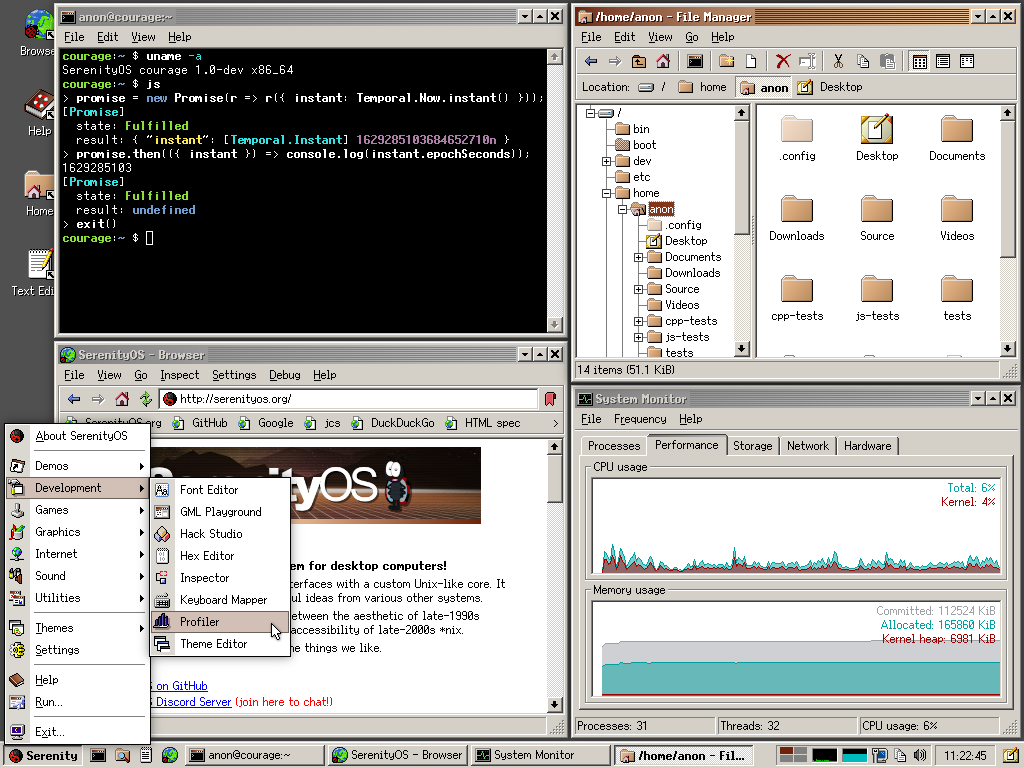:yakkie: The build process for the Zig compiler is more involved than most of the other ports, because the Zig compiler is mostly self-hosting. In order to build it, the zig-bootstrap build system is used, which does the following: 1) Build LLVM for the host OS; 2) Build Zig for the host OS with the SerenityOS target enabled; 3) Build zlib, zstd and LLVM for SerenityOS using `zig cc` as the C/C++ compiler; 4) Build Zig for SerenityOS using the host Zig. A few hacks are required in order to tell `zig cc` and zig about what Serenity's libc looks like in the build process, but other than that it's fairly straightforward. All of the patches that are included with this commit are Zig-upstream ready once the LLVM patches are upstreamed. |
||
|---|---|---|
| .devcontainer | ||
| .github | ||
| AK | ||
| Base | ||
| Documentation | ||
| Kernel | ||
| Meta | ||
| Ports | ||
| Tests | ||
| Toolchain | ||
| Userland | ||
| .clang-format | ||
| .clang-tidy | ||
| .editorconfig | ||
| .gitattributes | ||
| .gitignore | ||
| .mailmap | ||
| .pre-commit-config.yaml | ||
| .prettierignore | ||
| .prettierrc | ||
| .ycm_extra_conf.py | ||
| azure-pipelines.yml | ||
| CMakeLists.txt | ||
| CONTRIBUTING.md | ||
| LICENSE | ||
| README.md | ||
| SECURITY.md | ||
SerenityOS
Graphical Unix-like operating system for x86 computers.
About
SerenityOS is a love letter to '90s user interfaces with a custom Unix-like core. It flatters with sincerity by stealing beautiful ideas from various other systems.
Roughly speaking, the goal is a marriage between the aesthetic of late-1990s productivity software and the power-user accessibility of late-2000s *nix. This is a system by us, for us, based on the things we like.
You can watch videos of the system being developed on YouTube:
FAQ: Frequently Asked Questions
Screenshot
Features
- Modern x86 32-bit and 64-bit kernel with pre-emptive multi-threading
- Browser with JavaScript, WebAssembly, and more (check the spec compliance for JS, CSS, and WASM)
- Security features (hardware protections, limited userland capabilities, W^X memory,
pledge&unveil, (K)ASLR, OOM-resistance, web-content isolation, state-of-the-art TLS algorithms, ...) - System services (WindowServer, LoginServer, AudioServer, WebServer, RequestServer, CrashServer, ...) and modern IPC
- Good POSIX compatibility (LibC, Shell, syscalls, signals, pseudoterminals, filesystem notifications, standard Unix utilities, ...)
- POSIX-like virtual file systems (/proc, /dev, /sys, /tmp, ...) and ext2 file system
- Network stack and applications with support for IPv4, TCP, UDP; DNS, HTTP, Gemini, IMAP, NTP
- Profiling, debugging and other development tools (Kernel-supported profiling, detailed program analysis with software emulation in UserspaceEmulator, CrashReporter, interactive GUI playground, HexEditor, HackStudio IDE for C++ and more)
- Libraries for everything from cryptography to OpenGL, audio, JavaScript, GUI, playing chess, ...
- Support for many common and uncommon file formats (PNG, JPEG, GIF, MP3, WAV, FLAC, ZIP, TAR, PDF, QOI, Gemini, ...)
- Unified style and design philosophy, flexible theming system, custom (bitmap and vector) fonts
- Games (Solitaire, Minesweeper, 2048, chess, Conway's Game of Life, ...) and demos (CatDog, Starfield, Eyes, mandelbrot set, WidgetGallery, ...)
- Every-day GUI programs and utilities (Spreadsheet with JavaScript, TextEditor, Terminal, PixelPaint, various multimedia viewers and players, Mail, Assistant, Calculator, ...)
... and all of the above are right in this repository, no extra dependencies, built from-scratch by us :^)
Additionally, there are over two hundred ports of popular open-source software, including games, compilers, Unix tools, multimedia apps and more.
How do I read the documentation?
Man pages are available online at man.serenityos.org. These pages are generated from the Markdown source files in Base/usr/share/man and updated automatically.
When running SerenityOS you can use man for the terminal interface, or help for the GUI.
Code-related documentation can be found in the documentation folder.
How do I build and run this?
See the SerenityOS build instructions. Serenity runs on Linux, macOS (aarch64 might be a challenge), Windows (with WSL2) and many other *Nixes with hardware or software virtualization.
Get in touch and participate!
Join our Discord server: SerenityOS Discord
Before opening an issue, please see the issue policy.
A general guide for contributing can be found in CONTRIBUTING.md.
Authors
- Andreas Kling - awesomekling
- Robin Burchell - rburchell
- Conrad Pankoff - deoxxa
- Sergey Bugaev - bugaevc
- Liav A - supercomputer7
- Linus Groh - linusg
- Ali Mohammad Pur - alimpfard
- Shannon Booth - shannonbooth
- Hüseyin ASLITÜRK - asliturk
- Matthew Olsson - mattco98
- Nico Weber - nico
- Brian Gianforcaro - bgianfo
- Ben Wiederhake - BenWiederhake
- Tom - tomuta
- Paul Scharnofske - asynts
- Itamar Shenhar - itamar8910
- Luke Wilde - Lubrsi
- Brendan Coles - bcoles
- Andrew Kaster - ADKaster
- thankyouverycool - thankyouverycool
- Idan Horowitz - IdanHo
- Gunnar Beutner - gunnarbeutner
- Tim Flynn - trflynn89
- Jean-Baptiste Boric - boricj
- Stephan Unverwerth - sunverwerth
- Max Wipfli - MaxWipfli
- Daniel Bertalan - BertalanD
- Jelle Raaijmakers - GMTA
- Sam Atkins - AtkinsSJ
- Tobias Christiansen - TobyAsE
- Lenny Maiorani - ldm5180
- sin-ack - sin-ack
- Jesse Buhagiar - Quaker762
- Peter Elliott - Petelliott
- Karol Kosek - krkk
- Mustafa Quraish - mustafaquraish
- David Tuin - davidot
- Leon Albrecht - Hendiadyoin1
- Tim Schumacher - timschumi
- Marcus Nilsson - metmo
- Gegga Thor - Xexxa
- kleines Filmröllchen - kleinesfilmroellchen
- Kenneth Myhra - kennethmyhra
- Maciej - sppmacd
- Sahan Fernando - ccapitalK
- Benjamin Maxwell - MacDue
- Dennis Esternon - djwisdom
- frhun - frhun
- networkException - networkException
- Brandon Jordan - electrikmilk
- Lucas Chollet - LucasChollet
- Timon Kruiper - FireFox317
- Gregory Bertilson - Zaggy1024
And many more! See here for a full contributor list. The people listed above have landed more than 100 commits in the project. :^)
License
SerenityOS is licensed under a 2-clause BSD license.


